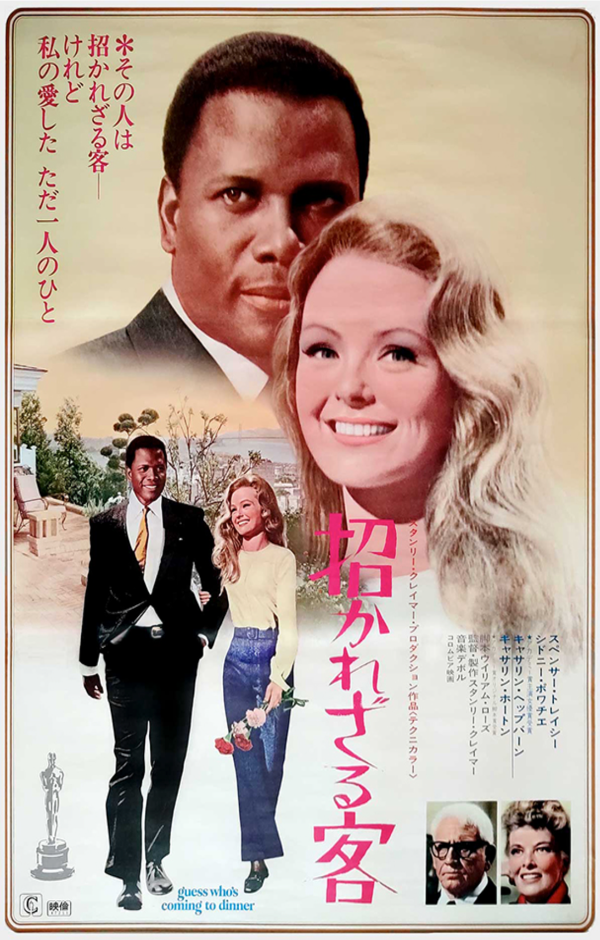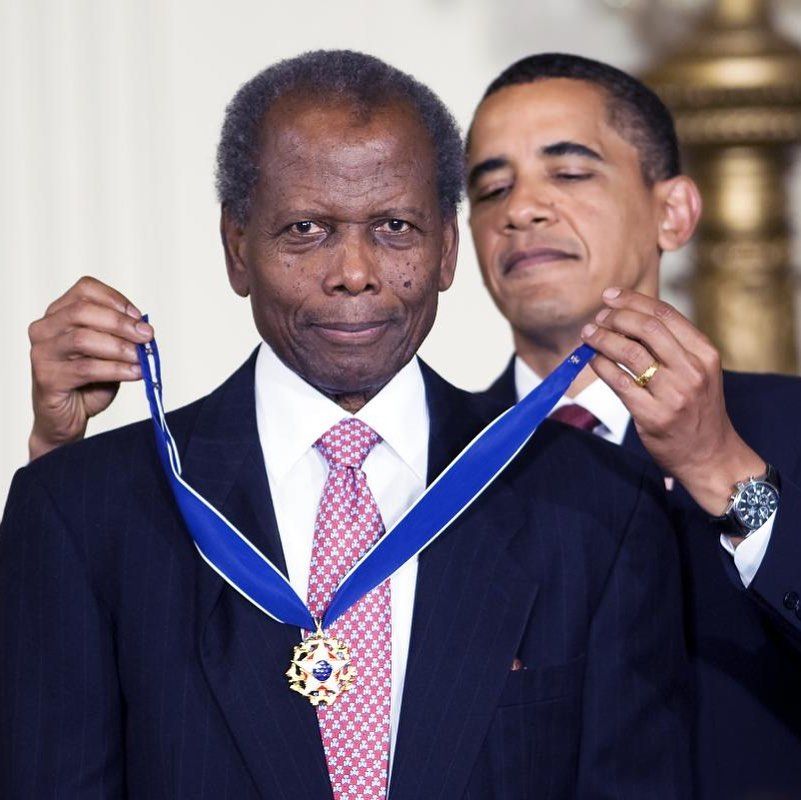
Sidney Poitier – African American Landmark Actor & Director
In 1963 Sidney Poitier became the first African American to win an Academy Award for Best Actor in a Lead Role creating the character of Homer Smith in Lilies of the Field.
His 40+ year career as an Oscar-winning star and film director broke down barriers for actors of color, becoming a Hollywood leading man at a time before black Americans were even granted full civil rights. He also opened doors for black directors after stepping behind the camera to direct nine features. In addition, he served as the non-resident Bahamian Ambassador to Japan and UNESCO and was recipient of the United States’ highest civilian honor, the Presidential Medal of Freedom .
The Beginning
It was from Cat Island in the Bahamas that he came. He was born unexpectedly in Miami in 1927 while his parents, Evelyn and Reginald James Poitier, were there selling tomatoes and other produce. Due to his unplanned birth on American soil he was automatically entitled to citizenship and at 15 he moved to Miami to live with his brother.
At 18, he went to New York, did menial jobs, slept in a bus terminal toilet, did a brief stint in the Army and did more menial jobs in Harlem. An impulsive audition at the North American Negro Theatre was rejected so forcefully that Poitier dedicated the next six months to overcoming his accent and improving his acting and, on second try, was accepted.
Hollywood Calls
In 1955 he landed his breakthrough film role as an incorrigible high school student in the film Blackboard Jungle. In 1958, Poitier starred with Tony Curtis as chained-together escaped convicts in the The Defiant Ones, which received nine Academy Award nominations. Both actors received a nomination for Best Actor, with Poitier’s being the first for a black actor, as well as a nomination for a BAFTA, which he won. In 1964, he won the aforementioned Academy Award as well as the Golden Globe Award for Best Actor for Lilies of the Field . Poitier also received acclaim for A Raisin in the Sun (1961) and A Patch of Blue (1965).
Top Box Office Star of the Year
He continued to break ground in three successful 1967 films which dealt with issues of race and race relations: To Sir, with Love; Guess Who’s Coming to Dinner, and In the Heat of the Night and was the top box-office star of the year. The character of Virgil Tibbs, a Philadelphia, Pennsylvania, detective, was his most successful character and became the subject of two sequels: They Call Me MISTER Tibbs! (1970) and The Organization (1971). Many of the films in which Poitier starred during the 1960s would later be cited as social thrillers by both filmmakers and critics.
Setting An Example
Poitier began to be criticized for being typecast as over-idealized African-American characters who were not permitted to have any sexuality or personality faults, such as his character in Guess Who’s Coming To Dinner. Poitier was well aware of this pattern, but was conflicted on the matter. He wanted more varied roles; but he also felt obliged to set an example with his characters, by challenging old stereotypes as he was the only major African American actor being cast in leading roles in the American film industry, at that time.
Actor/Director
Poitier turned to acting/directing with the action-comedies Uptown Saturday Night (1974), Let’s Do It Again (1975), and A Piece of the Action (1978), all co-starring Bill Cosby. During a decade away from acting, he directed the hit Stir Crazy (1980) starring Richard Pryor and Gene Wilder, among other films. He returned to acting in the late 1980s and early 1990s in a few thrillers and television roles.
Honors & Recognition
Poitier was made an honorary Knight Commander of the Order of the British Empire by Queen Elizabeth II in 1974. In 2002, Poitier received the 2001 Honorary Academy Award for his overall contribution to American cinema. Later in the ceremony, Denzel Washington won the award for Best Actor for his performance in Training Day becoming the second black actor to win the award. In his victory speech Washington saluted Poitier by saying “I’ll always be chasing you, Sidney. I’ll always be following in your footsteps. There’s nothing I would rather do, sir.
In 1999, the American Film Institute ranked Poitier 22nd on their list of Greatest Male Stars of classic Hollywood cinema. He is one of only two living actors on the AFI list, the other being Sophia Loren. In April 1997, Poitier was appointed ambassador of the Bahamas to Japan, a position he held until 2007. From 2002 to 2007, he was concurrently the ambassador of the Bahamas to UNESCO.

In 2009 Poitier was awarded the Presidential Medal of Freedom, the United States’ highest civilian honor.In 2016, he was awarded the BAFTA Fellowship for outstanding lifetime achievement in film. –Wikipedia
Guess Who’s Coming To Dinner
The above photograph is from the 1967 and 1972 Japanese release of the film. To learn more about it please Click Here.
- African American Movie Memorabilia
- African Americana
- Black History
- Celebrating Women’s HistoryI Film
- Celebrity Photographs
- Current Exhibit
- Famous Female Vocalists
- Famous Hollywood Portrait Photographers
- Featured
- Film & Movie Star Photographs
- Film Noir
- Film Scripts
- Hollywood History
- Jazz Singers & Musicians
- LGBTQ Cultural History
- LGBTQ Theater History
- Lobby Cards
- Movie Memorabilia
- Movie Posters
- New York Book Fair
- Pressbooks
- Scene Stills
- Star Power
- Vintage Original Horror Film Photographs
- Vintage Original Movie Scripts & Books
- Vintage Original Publicity Photographs
- Vintage Original Studio Photographs
- WalterFilm
